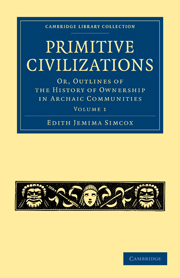Book contents
- Frontmatter
- PREFACE
- Contents
- CHAPTER 1 INTRODUCTION
- CHAPTER II PREHISTORIC PROBLEMS
- BOOK I OWNERSHIP IN EGYPT
- BOOK II ANCIENT BABYLONIA
- BOOK III FROM MASSALIA TO MALABAR
- FROM MASSALIA TO MALABAR
- CHAPTER I THE PHŒNICIANS AND CARTHAGE
- CHAPTER II PREHISTORIC POPULATIONS OF ASIA MINOR, GREECE, AND ITALY
- CHAPTER III THE ETRUSCANS, LYCIANS, AND RHODIANS
- CHAPTER IV THE LAWS OF CHARONDAS
- CHAPTER V LEGENDARY AMAZONS AND HISTORICAL IBERIANS
- CHAPTER VI CRETE AND SPARTA
- CHAPTER VII A SYRIAN LAW-BOOK
- CHAPTER VIII ANCIENT ARABIA
- CHAPTER IX HAMITIC AFRICAN TRIBES
CHAPTER VII - A SYRIAN LAW-BOOK
Published online by Cambridge University Press: 07 September 2011
- Frontmatter
- PREFACE
- Contents
- CHAPTER 1 INTRODUCTION
- CHAPTER II PREHISTORIC PROBLEMS
- BOOK I OWNERSHIP IN EGYPT
- BOOK II ANCIENT BABYLONIA
- BOOK III FROM MASSALIA TO MALABAR
- FROM MASSALIA TO MALABAR
- CHAPTER I THE PHŒNICIANS AND CARTHAGE
- CHAPTER II PREHISTORIC POPULATIONS OF ASIA MINOR, GREECE, AND ITALY
- CHAPTER III THE ETRUSCANS, LYCIANS, AND RHODIANS
- CHAPTER IV THE LAWS OF CHARONDAS
- CHAPTER V LEGENDARY AMAZONS AND HISTORICAL IBERIANS
- CHAPTER VI CRETE AND SPARTA
- CHAPTER VII A SYRIAN LAW-BOOK
- CHAPTER VIII ANCIENT ARABIA
- CHAPTER IX HAMITIC AFRICAN TRIBES
Summary
The resemblances between Cretan and Berber custom are sufficiently marked to warrant the conjecture that Phænician and Syrian law and the Gortyn code might throw light upon each other. We have no information as to the characteristics of Syrian law; but a Syro-Roman law-book, ascribed to the 5th cent, a.d., in spite of its late date and the peremptory temper of Roman legislators, contains embedded within it traces of ancient local custom, the strength of which is best evidenced by their appearance here, in a late summary of Roman law, which—just in virtue of its non-Roman elements—continued in farce for centuries, over a wide area, even to the exclusion of the Justinian code.
Just as the character of the ancient laws of Minos shows through the transparent network of Hellenic restrictions, so the peculiarities of Syrian usage were strong enough to impress their own shape upon a formal declaration of what was allowed and forbidden by Roman law. The work seems to have been drawn up by some provincial law practitioner, for the benefit of his countrymen, much as a native Hindoo might collect together such provisions of English law as Hindoos are required to obey, and yet would not obey spontaneously, because of their divergence from ancient national usage. The learned editors of this work1 regard it mainly as an exposition of Roman law, adding comparatively little to the knowledge either of its theory or its practice.
- Type
- Chapter
- Information
- Primitive CivilizationsOr, Outlines of the History of Ownership in Archaic Communities, pp. 487 - 495Publisher: Cambridge University PressPrint publication year: 2010First published in: 1894



